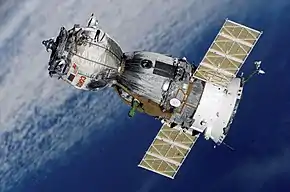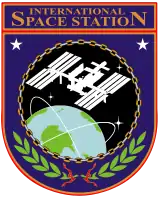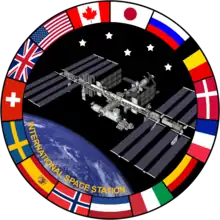Soyuz TMA-05M
Soyuz TMA-05M was the 114th flight of a Soyuz spacecraft. It was launched on 15 July 2012, transporting three members of the Expedition 32 crew to the International Space Station (ISS).[1][3] The Soyuz remained docked to the ISS throughout the mission to serve as an emergency escape vehicle. The launch also coincided with the 37th anniversary of the Apollo–Soyuz Test Project. Soyuz TMA-05M successfully returned to Earth on 19 November 2012.[4]
| Operator | Roskosmos |
|---|---|
| COSPAR ID | 2012-037A |
| SATCAT no. | 38671 |
| Spacecraft properties | |
| Spacecraft type | Soyuz-TMA 11F747 |
| Manufacturer | RKK Energia |
| Crew | |
| Crew size | 3 |
| Members | Yuri Malenchenko Sunita Williams Akihiko Hoshide |
| Callsign | Agate |
| Start of mission | |
| Launch date | 15 July 2012, 02:40:03 UTC[1][2] |
| Rocket | Soyuz-FG |
| Launch site | Baikonur 1/5 |
| End of mission | |
| Landing date | 19 November 2012, 01:53:30 UTC |
| Orbital parameters | |
| Reference system | Geocentric |
| Regime | Low Earth |
| Docking with ISS | |
| Docking port | Rassvet nadir |
| Docking date | 17 July 2012 04:51 UTC |
| Undocking date | 18 November 2012 22:26 UTC |
| Time docked | 124d 17h 35m |
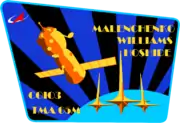
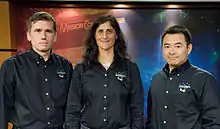 (l-r) Malenchenko, Williams and Hoshide Soyuz programme (Crewed missions) | |
Crew
| Position[5][6][7] | Crew member | |
|---|---|---|
| Commander | Expedition 32 Fifth spaceflight | |
| Flight Engineer 1 | Expedition 32 Second spaceflight | |
| Flight Engineer 2 | Expedition 32 Second spaceflight | |
Backup crew
| Position[8] | Crew Member | |
|---|---|---|
| Commander | ||
| Flight Engineer 1 | ||
| Flight Engineer 2 | ||
Launch

Soyuz TMA-05M was launched atop of a Soyuz FG rocket at 2:40 GMT on July 15, 2012 from the Baikonur Cosmodrome, Kazakhstan. Following the flawless launch, the Soyuz spacecraft successfully achieved orbital insertion 9 minutes later and began its 34-orbit journey to the Space Station.
Docking
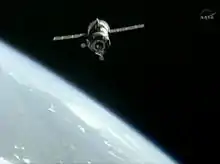
As part of its phasing maneuvers to catch up with the ISS, 3.5 and 4.5 hours into the mission, the Soyuz Spacecraft performed two large SKD Main Propulsion System Burns changing the vehicle's speed by 41.5 m/s and 23.9 m/s, respectively.[9] These burns were followed by a minor maneuver on July 16 for a velocity change of two m/s. The on time automated docking sequence began at 2:31 GMT on July 17, 2012.
The Crew activated the KURS Navigation System that provides accurate range and velocity data for the spacecraft's on-board computers. The station crew of Padalka, Revin and Acaba got up early changing their sleep cycles to support the rendezvous and docking operations of the Soyuz. Although the rendezvous and docking sequence is fully automated, cosmonaut Malenchenko and Russian mission controllers in Korolev, Moscow monitored the systems as well. As Soyuz TMA-05M approached the ISS, the spacecraft completed a series of trajectory correction maneuvers. At a range of 8 Kilometers to the space station, the Soyuz activated its TV system needed for automated operation monitoring. At a distance of 300 meters to the space station, Russian flight controllers issued a "GO" for the Flyaround to align Soyuz TMA-05M with the docking port on the Rassvet Module.
With the Flyaround completed, a short period of Stationkeeping was initiated at a range of 190 meters. The opportunity gave the flight controllers a chance to check the Soyuz systems and the alignment with the docking port. The crew was given a "GO" and the final approach commenced at 4:40 GMT.
Soyuz TMA-05M completed a successful docking at 4:51 GMT while the space station was flying high above North-East Kazakhstan: one minute earlier than planned. Shortly after, the docking probe was retracted and hooks started closing to establish the hard mate. The hard mate was followed by the standard one-hour leak check operations. After leak checks were completed, the crew opened the hatches and floated into the ISS. The arrival of Malenchenko, Williams and Hoshide on board Soyuz TMA-05M restored the space station's crew to full strength at six.
Return to Earth
| Wikinews has related news: |
Soyuz TMA-05M undocked from the ISS on 18 November 2012 at 10:26 PM (GMT), carrying Hoshide, Malenchenko and Williams, and landed safely at 1:53:30 AM (GMT) the following day.[4] A source at Energia told the Novosti news agency that the location was 51°.05 N, 67°.16 E in Kazakhstan, about 4.7 km from the aim point. Confusion during the NASA TV broadcast of the event led to some,[10] including NASA's own Media Services,[11] recording the landing time incorrectly as 01:56. The spacecraft's departure marked the end of Expedition 33 and the start of Expedition 34.
Gallery
 The Soyuz TMA-05M crew members conduct their ceremonial tour of Red Square on 22 June 2012.
The Soyuz TMA-05M crew members conduct their ceremonial tour of Red Square on 22 June 2012. Crew members during a suited "fit check" of the Soyuz TMA-05M spacecraft at the Baikonur Cosmodrome.
Crew members during a suited "fit check" of the Soyuz TMA-05M spacecraft at the Baikonur Cosmodrome. The spacecraft during pre-launch processing on 8 July 2012.
The spacecraft during pre-launch processing on 8 July 2012. The spacecraft being transported to the launch site on 12 July 2012.
The spacecraft being transported to the launch site on 12 July 2012. The TMA-05M crew wave to spectators before launch on 15 July 2012.
The TMA-05M crew wave to spectators before launch on 15 July 2012.
References
| Wikimedia Commons has media related to Soyuz TMA-05M. |
- "NASA's Consolidated Launch Schedule". NASA. Retrieved 5 June 2012.
- William Harwood. "Russia Orders Soyuz Delays In Wake Of Test Mishap". SpaceflightNow.com. Retrieved 2012-02-12.
- "Soyuz Launches New Crew Into Space". The Moscow Times. 15 July 2012. Retrieved 16 July 2012.
- "MKC Союз ТМА-05М". Retrieved 29 November 2012.
- NASA (2009). "Astronaut Bio: Sunita Williams". NASA. Retrieved December 22, 2009.
- JAXA (2009). "Selection of Astronaut Akihiko Hoshide as a Member of the ISS Expedition Crew". JAXA. Retrieved November 19, 2009.
- NASA HQ (2010). "NASA And Partners Assign Crews For Upcoming Space Station Missions". NASA. Retrieved July 8, 2010.
- "Орбитальные полёты". 2012.
- "Soyuz TMA-05M arrives at ISS restoring the Expedition 32 Crew to Six". SPACEFLIGHT 101. July 17, 2012. Archived from the original on February 12, 2013. Retrieved July 22, 2012.
- Pete Harding (18 November 2012). "Three crewmembers depart ISS for pre-dawn return to Earth".
- NASA News Release 12-404 (18 November 2012). "International Space Station Astronauts Land Safely in Kazakhstan".
